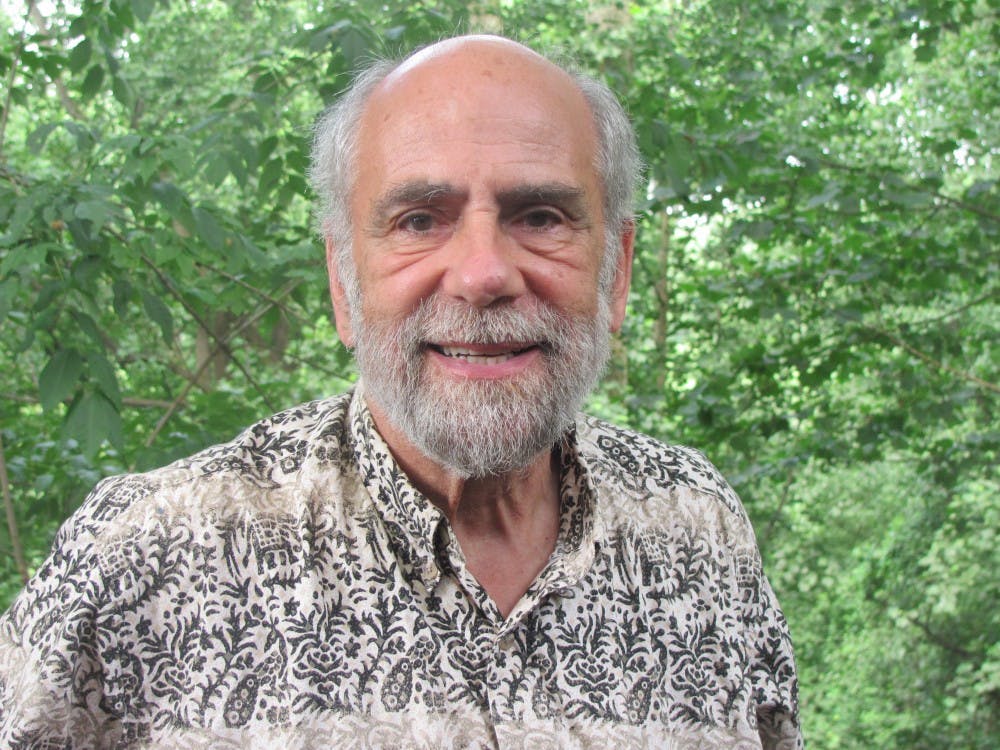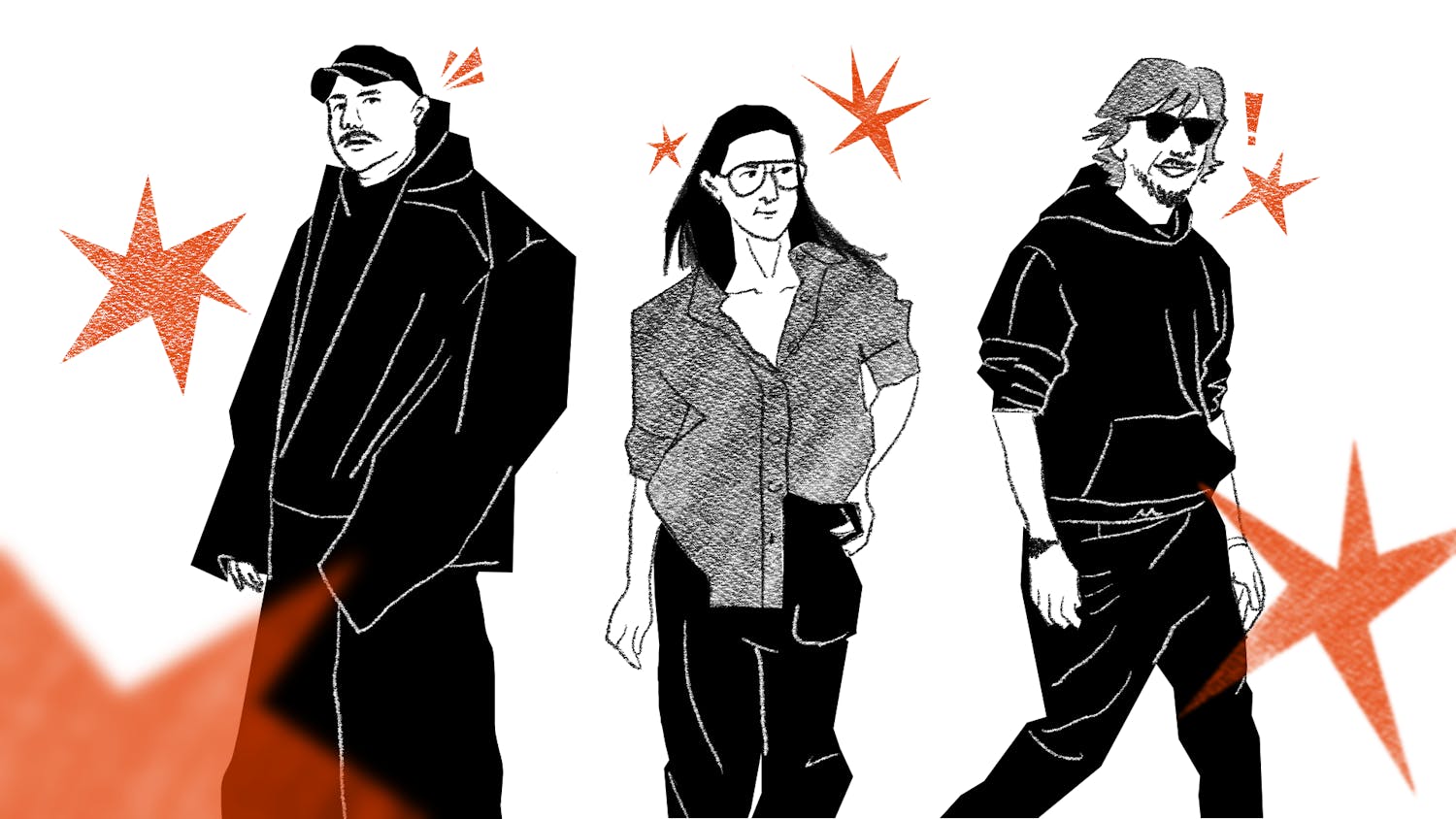Professor Paul Rozin never lingers on anything. Every few years, his research takes a new turn, or he decides to teach a different course—and sometimes, he creates his own.
"Most people teach something they like and they know well, and they'll do it for their whole career. But I don't stick on a problem for too long. I'll get interested in something else," Rozin says.
He has paralleled his diverse interests in teaching with an equally expansive realm of research over the past five decades, since he was hired in Penn in 1963.
The retired psychology professor relaxes into a plush gray sofa in his living room. He sits cross–legged, his yellow–socked foot jiggles a little quicker, and his voice grows more enthusiastic as he describes his research and the courses he's taught.
While most courses that are offered in college are discipline–focused courses, or rooted in a specific field, Rozin's fascinating honors seminar, called "Food: Biological, medical, psychological, cultural and historical perspectives," deviates from the norm and focuses on another subject—food. Students analyze food from several different perspectives.
"It's a critical thinking course where you think about issues in a clear, relatively unbiased way," Professor Rozin explains, where you "see the same thing in different ways."
Students study, discuss, and meditate on food from the angles of nutrition, medicine, history, psychology, anthropology, and sociology, both quantitatively and qualitatively.
Throughout the course, students go to a dairy farm, meet chefs who specialize in an array of cuisines, visit a molecular gastronomy kitchen, and complete data analyses and ethnographies on food.
"[Students] see all the different ways you can pick up knowledge, and how you can digest it and present it," Professor Rozin says. Unfortunately, the course was not offered for the Spring 2019 semester.
He's taught a number of experimental courses at Penn, including "How Do You Know?" where he acted as the "MC, or the glue of the course."
The course entailed five faculty from different fields explaining how they find out anything in his or her respective discipline—how mathematicians derive proofs, how political scientists or lawyers evaluate evidence, how biologists conduct experiments, how English scholars differentiate history from literature. Once, Professor Rozin recalls, a geologist spoke to students about the skeptics' perspective on climate change.
"We do have ways in science of making progress and doing things better, but we make mistakes, and we have to assimilate those two facts," Professor Rozin remarks. The experimental nature of his courses attempts to reconcile this dichotomy in science by approaching subjects through multiple disciplines.
He aims for students to grasp "a sense of reading something and taking it seriously, but not believing everything that's in there," encouraging them to "be critical, but not skeptical," a theme that is resonant in both his research and teachings.
Born and raised in Brooklyn, New York, Rozin grew up an only child of Jewish parents. He recalls that they were "relatively poor," but that didn't keep his parents from being heavily invested in his education. After taking an early entrance exam in his high school, Rozin went on to college after only two years of high school in 1952, a fact he mentions quite nonchalantly.
"Nearly half of my class did the same," he remembers.
Rozin attended the University of Chicago for his undergraduate degree, where the newly reformed curriculum enforced general education requirements for all students. He had to take three years of every type of class, ranging from humanities to STEM. The classes were relatively small, with only 20 to 25 students, and readings were exclusively original material—there were no textbooks.
"I was lucky to be thrown in the middle of an experimental undergraduate education," Rozin recalls about his time studying at the University of Chicago. "Intellectually, it was the most important move I made."
He then completed a joint Ph.D at Harvard in psychology and biology, which inspires much of his research to this day.
He also enlisted in a postdoctorate program in Harvard's Nutritional Health division, which exposed Rozin to a body of medical knowledge—and more importantly, medical perspective—that became instrumental for his later research.
Upon entering the job market, Rozin got three offers, and one of them was from Penn.
"It was a no–brainer for me," he says. Penn was the place for him.
"I was interested in the determinants of hunger in both animals and humans. And [Penn] was the world's best place on hunger at the time," Rozin says. He was hired to teach physiological psychology, an equivalent of the Introduction to the "Brain and Behavior" course today.
At the time, he recollects, Penn's psychology department, the oldest continuing department in North America, "was in the basement of College Hall."
Rozin's early work in the early 1960s to 70s was about animals' food intake. "My research itself was boring," he remembered, and "it didn't directly map onto anything I thought was important in the world…I really wanted to work on a real problem."
So Rozin changed course, and moved to a study that was completely different: researching why some children in Philadelphia could not read. He found that the reason that kids were having trouble reading English was that they couldn't get the idea that the alphabet represented distinct sounds. The goal of his research was to document the problem and find out how language could be taught differently.
Rozin helped engineer a curriculum that focused on this problem—a reading education that guided students through the communication milestones of human civilization, from cave paintings to writing itself.
The professor's next leap in research led him to his primary topic of interest: food. While his wife, Elisabeth Rozin, was authoring The Flavor–Principle Cookbook, Rozin took an interest in how certain ingredients managed to permeate large populations. For example, Professor Rozin lists how the primary ingredients in India are chili peppers, cumin, and garam masala; for China, there's ginger root, soy, and rice wine; in Mexico, tomatoes and lime.
Rozin was intrigued by how the "most commonly used spice in the world, other than garlic, is the chili pepper—it tastes terrible, originally. How could something that tastes so bad be used by billions of people everyday?"
This question raised others for Rozin, like how meat could simultaneously be considered the most desired and tabooed food, which also "got me into vegetarianism," Rozin says. The dual perception of meat is still a topic of his research today.
Another current component of his research: insects.
"I'm now working on getting people to eat insects more. They can be made cheap, they're very nutritious, very efficient, and they don't take up much space," Rozin explains.
He anticipates human aversion to eating insects, but describes the "ecologically friendly" prospect of consuming insects as a public health issue. He says that mass adoption of this eating habit could significantly benefit the environment. Rozin has also studied other sustainable practices that face the obstacle of "human disgust," such as drinking recycled water.
"Disgust turns out to be very important in public health," Rozin remarks.
In the 1990s, Rozin served as a director of the Solomon Asch Center for the Study of Ethnopolitical Conflict at Penn, a multidisciplinary initiative that addressed the psychology of refugees and related global conflicts. The program involved faculty from different departments, seminars, and every summer.
"It was the single best thing I was involved in to make the world a better place," Rozin says. The initiative strived to facilitate a clearer, deeper understanding of global crises relating to ethnic conflict, predominantly through the lens of psychology.
"[Refugees] are not mentally disturbed, the way psychologists talk about people with mental disorders—they have a world disorder. Their world screwed them," he says.
He visited refugee camps in Sri Lanka for three months, gaining insight into the crisis and finding that psychology was "needed to study what makes people so polarized."
Rozin also notes that "proponents of ethnic conflict are not like criminals: they're people who believe in something, and their belief produces some hostile reaction to others and that's not a good thing, but it's not like they're trying to wipe people out."
He brings up the contemporary example of ISIS: "They're deeply indoctrinated—they believe in something—they're not just running around shooting people." Rozin was interested in distinguishing them from "what would normally be called criminals."
Rozin now researches sensible food choices, and emphasizes that his definition of "sensible" greatly differs from that of the "American health establishment's version." While the latter advocates for decreasing fat consumption, Rozin thinks that we should eat more broadly. "I'm interested in different ways to minimize the cruelty and maximize the Earth's potential and our health," he says.
He notes that all three of these work in harmony—an increasingly plant–based diet, along with shifts to insect consumption, further each of those goals.
Rozin also currently studies the differences between American and French cuisine. He observes that while the French are slightly healthier, less obese, and happier, they also eat more fat. This empirical puzzle is also a component of his research.
In addition to his decades of research, teaching is a passion very close to his heart. His students inspire him in more ways than one.
He mentions a former student of his, Amy Wrzesniewski, "a very special undergraduate" who started working for Rozin as a work study student as a sophomore.
"She was a terrific researcher," he remembers. She eventually wrote a senior thesis that went on to become the focus of her very successful career.
"It's through Amy, in a way, that I've added something better to the world," Rozin says. "One way that I make a difference in the world, I hope, is through teaching students."
"People who have callings never say, 'thank God it's Friday'. I've never said, 'thank God it's Friday,'" Rozin says with a smile.







